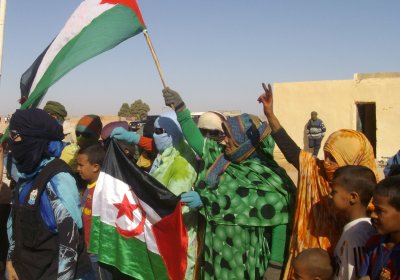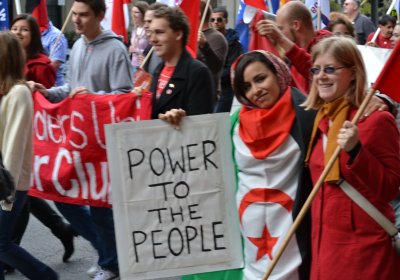Western Sahara is recognised by the United Nations as the last non-self-governing territory in Africa. Between 1973 and 1991 it was at war, as the pro-independence Polisario Front fought first against colonial rulers Spain, and after 1975, against Morocco, which invaded with Spanish encouragement.
Western Sahara
Offshore oil drilling operations off Western Sahara, carried out by the US firm Kosmos Energy, were denounced by Western Sahara Resources Watch (WSRW) on March 2.
“Kosmos Energy did nothing to obtain the consent of the people of Western Sahara,” said WSRW chair Erik Hagen.
The Dallas-based company said its exploration well had not yielded a commercial find and would be plugged, Associated Press said on March 2.
Talking about music might sound strange for people who live in refugee camps and are deeply burdened with many other problems needing to be voiced.
But the huge role music played in the Saharawi people's struggle for independence leaves me with no choice e but to try to talk a little about the magical role revolutionary songs are playing in my people’s daily fight for self-determination.
Human rights conditions in Moroccan-occupied Western Sahara remain dire according to activists, even though the territory is once again open for business to European fishing companies.
Despite Moroccan pledges to improve conditions for Western Sahara's indigenous Sahrawi, head of the Sahrawi Centre for Media and Communication Mohamed Brahim said the situation is getting worse under Moroccan rule.
“Nothing seems to be improving,” Brahim told Green Left Weekly from Laayoune.
In a divestment valued at 256 million euros, the Norwegian government pension fund has blacklisted Australian company Incitec Pivot and the US/Canadian company Potash last year due to their phosphate imports from occupied Western Sahara.
Minetu Larabas Sueidat is a young Saharawi woman living in refugee camps in Tinduf in the south-west of Algeria. Western Sahara, the land of the Saharawi people, has been occupied by Morocco since 1975. In 1991, the United Nations brokered ceasfire between Morocco and the pro-independence Polisario Front that supposed to include a referendum on self-determination, which has still not occurred.
After 40 years of struggle, in the place known as “Africa's last colony”, human rights abusers continue to be given a free hand by the international community.
As Western Sahara's independence movement, the Polisario Front, commemorated four decades of struggle on May 10, news broke of a Sahrawi activist who died in a Moroccan prison three days earlier.
Severe water shortages in the Sahrawi Arab Democratic Republic may become less frequent due to a Venezuelan government initiative to provide training to Sahrawi technicians.
SADR claims sovereignty over the entire territory of Western Sahara, most of which is occupied by Morocco. SADR administers about 20% of Western Sahara.
On February 14, the Venezuelan environment ministry said 10 technicians from SADR will be trained in hydro-geology and drilling at Venezuela’s National Hydraulics Laboratory.
Moroccan authorities have sentenced Western Saharan political prisoners to long jail sentences. The the prisoners had already spent two year in jail waiting for a trail. Amnesty International had called the trials flawed from the outset.
Eight Saharawi were sentenced to life in jail for peacefully demonstrating for the people of Western Sahara to be given a vote of self-determination, as promised by the United Nations. A further four activists received 30 years, seven received 25 years and two got 20-year sentences.
Over the past three years Christian Super, a not-for-profit industry fund, has engaged in dialogue with Australian company Wesfarmers over its sourcing of phosphate rock from Western Sahara. Phosphate is used in its production of agricultural superphosphate.
“Western Sahara is a disputed territory where human rights abuses have been reported,” said Tim Macready, chief investment officer for Christian Super. “Companies doing business in this area may unwittingly aggravate the conflict or become complicit to oppression.”
Western Saharan human rights campaigner Malak Amidane is touring Australia in May to raise awareness of the brutal occupation of her homeland.
Sahrawi human rights advocate and trade unionist Malak Amidane will visit Australia this month to share her experience of campaigning for justice in her homeland.
Previously a Spanish colony, Western Sahara was invaded by Morocco and Mauritania when Spain withdrew in 1975.
Today, 80% of the territory land is controlled by Morocco.
Amidane will meet with politicians and union leaders to lobby for greater support for Western Sahara.
She will also present a public lecture in Adelaide on May 3 at 5pm, at the University of Adelaide, Lower Napier, room G03.
- Previous page
- Page 3
- Next page






